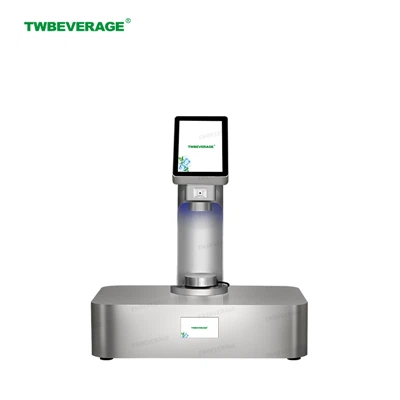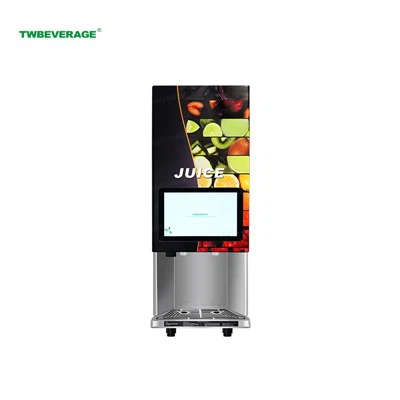As a supplier of glass chillers, I've witnessed firsthand how these innovative devices can transform the drinking experience. In this blog post, I'll delve into the science behind how a glass chiller affects the taste of drinks in the glasses and why it's a game-changer for both professional bartenders and home enthusiasts.
The Science of Temperature and Taste
Before we explore the impact of glass chillers, it's essential to understand the relationship between temperature and taste. Our taste buds are sensitive to temperature, and different flavors are more pronounced at specific temperatures. For example, cold temperatures can suppress sweetness and enhance bitterness, while warmer temperatures can bring out the sweetness and reduce the perception of bitterness.
When a drink is served in a warm glass, the temperature of the drink rises quickly, altering its flavor profile. On the other hand, a chilled glass helps maintain the optimal temperature of the drink, preserving its intended taste and aroma. This is particularly important for beverages that are best served cold, such as cocktails, beer, and wine.
How Glass Chillers Work
Glass chillers use various methods to rapidly cool glasses to the desired temperature. One common type of glass chiller is the Co2 Glass Froster, which uses carbon dioxide (CO2) to create a frosty coating on the outside of the glass. The CO2 rapidly cools the glass, causing moisture in the air to condense and freeze on the surface. This not only looks impressive but also helps keep the drink cold for longer.
Another popular option is the Countertop Glass Froster, which uses a refrigeration system to cool the glasses. These chillers are typically more compact and suitable for smaller bars or home use. They work by circulating cold air around the glasses, gradually lowering their temperature to the desired level.
The Impact on Taste
Now that we understand how glass chillers work, let's explore how they affect the taste of drinks in the glasses.
1. Preservation of Flavor
One of the primary benefits of using a glass chiller is that it helps preserve the flavor of the drink. By keeping the glass cold, the chiller prevents the drink from warming up too quickly, which can cause the flavors to dissipate or become muted. This is especially important for complex cocktails that rely on a delicate balance of flavors.
For example, a martini is a classic cocktail that is best served ice-cold. When served in a chilled glass, the martini retains its crispness and the flavors of the gin and vermouth are more pronounced. Without a glass chiller, the martini would warm up rapidly, and the flavors would start to blend together, resulting in a less enjoyable drinking experience.
2. Enhanced Aroma
In addition to preserving flavor, a glass chiller can also enhance the aroma of the drink. The cold temperature of the glass helps trap the volatile compounds in the drink, which are responsible for its aroma. When the drink is sipped, these compounds are released, providing a more intense and enjoyable olfactory experience.
For instance, a glass of red wine is known for its complex aroma. When served in a chilled glass, the wine's aroma is more concentrated, allowing the drinker to fully appreciate the different notes of fruit, spice, and oak. This can significantly enhance the overall enjoyment of the wine.


3. Improved Mouthfeel
The temperature of the glass can also affect the mouthfeel of the drink. A chilled glass can make a drink feel smoother and more refreshing, while a warm glass can make it feel heavy and cloying.
For example, a cold beer is often described as having a crisp and refreshing mouthfeel. When served in a chilled glass, the beer's carbonation is more pronounced, and the flavors are more balanced. This creates a more enjoyable drinking experience, especially on a hot day.
Other Benefits of Using a Glass Chiller
In addition to improving the taste of drinks, glass chillers offer several other benefits for both professional bartenders and home enthusiasts.
1. Presentation
A frosted or chilled glass adds a touch of elegance and sophistication to any drink. It makes the drink look more appealing and can enhance the overall presentation of the cocktail. This is particularly important in a professional setting, where first impressions matter.
2. Efficiency
Glass chillers can save time and effort in a busy bar or restaurant. Instead of having to pre-chill glasses in the freezer, bartenders can simply place the glasses in the chiller and have them ready to use in a matter of minutes. This allows them to focus on making the perfect cocktail and providing excellent customer service.
3. Consistency
Using a glass chiller ensures that every drink is served at the same optimal temperature. This consistency is essential for maintaining the quality of the drinks and providing a consistent experience for customers. Whether it's a busy Friday night or a slow Tuesday afternoon, customers can expect their drinks to be served ice-cold and tasting their best.
Conclusion
In conclusion, a glass chiller is a valuable tool for anyone who wants to enhance the taste and presentation of their drinks. By keeping the glasses cold, a glass chiller helps preserve the flavor, enhance the aroma, and improve the mouthfeel of the drinks. It also offers several other benefits, such as improved presentation, efficiency, and consistency.
If you're a professional bartender or a home enthusiast looking to take your drinking experience to the next level, I highly recommend investing in a glass chiller. Whether you choose a Co2 Glass Froster or a Countertop Glass Froster, you'll be amazed at the difference it can make.
If you're interested in learning more about our glass chillers or would like to discuss your specific needs, please don't hesitate to contact us. We'd be happy to help you find the perfect glass chiller for your bar or home.
References
- "The Science of Taste and Temperature." Scientific American.
- "How Temperature Affects the Taste of Wine." Wine Enthusiast.
- "The Importance of Chilled Glasses in Cocktail Making." Bartender Magazine.






